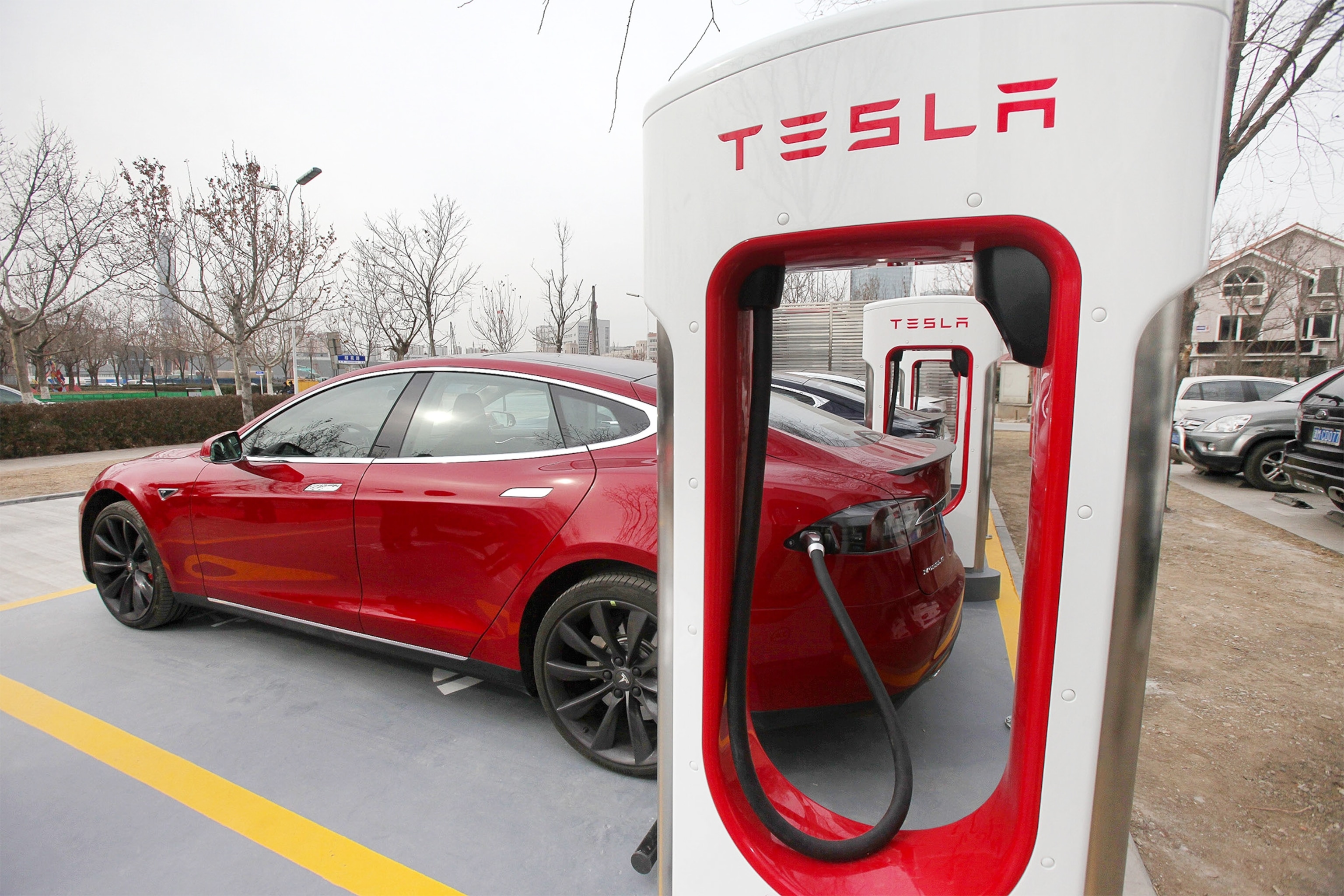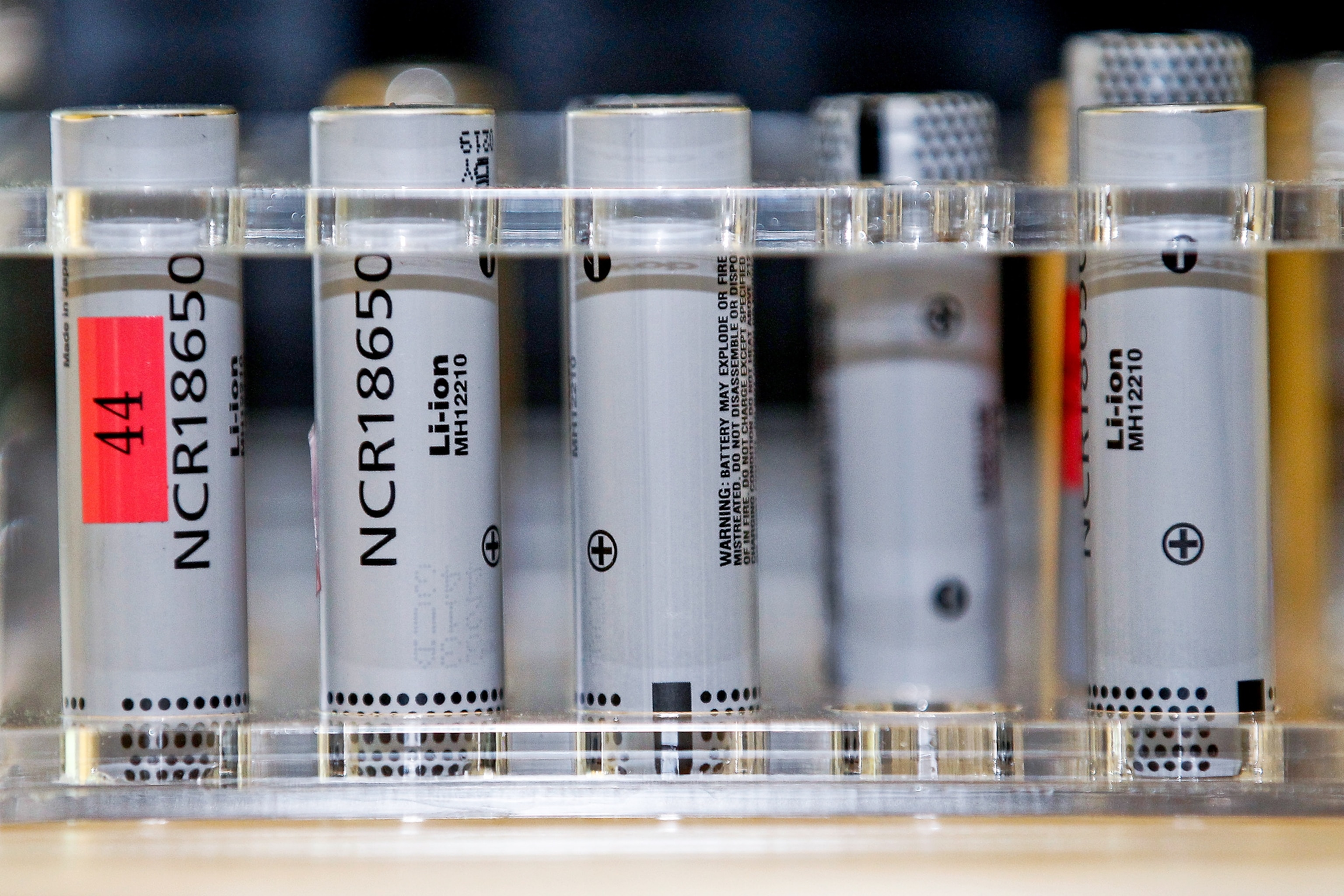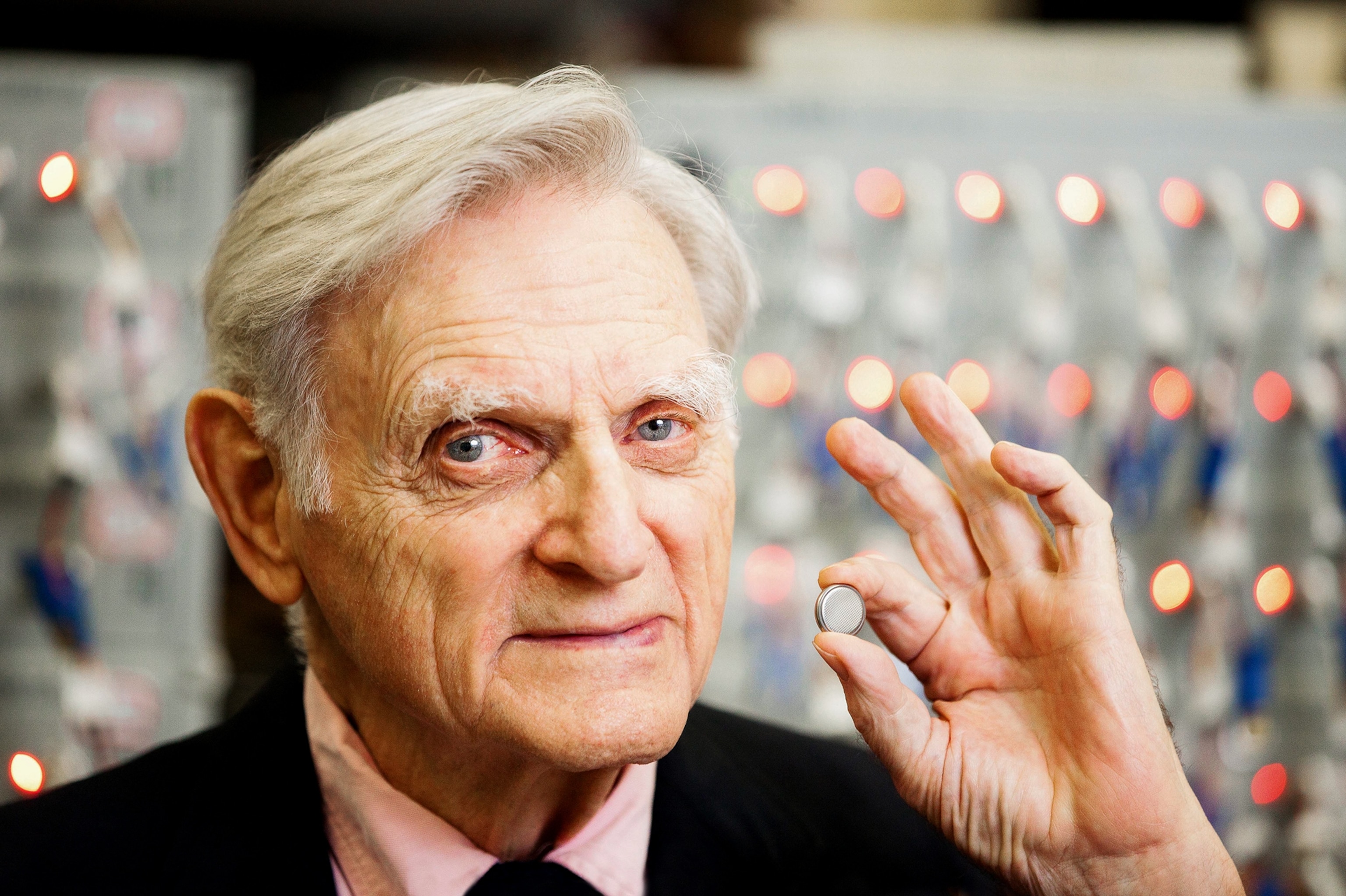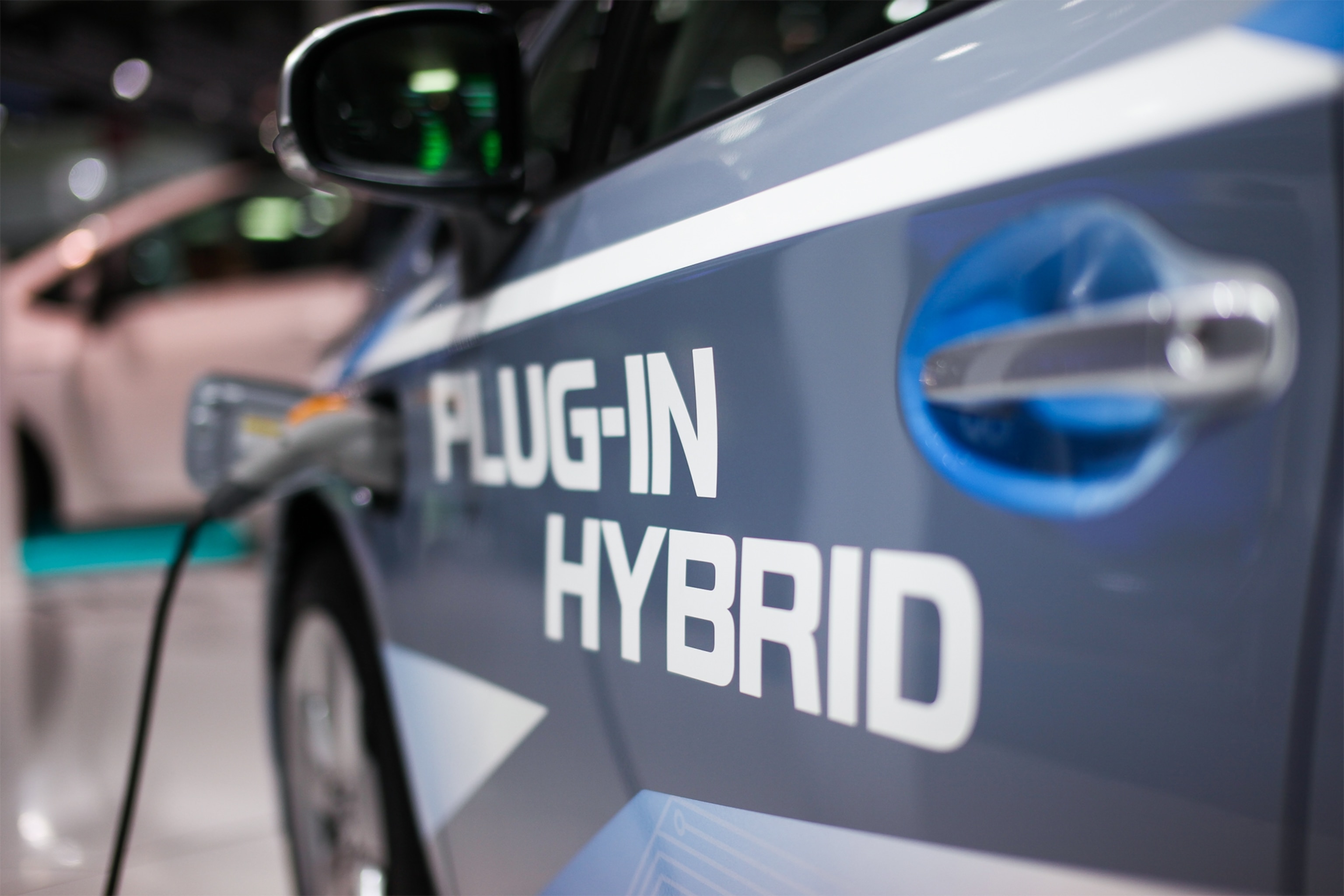
Ready, Set, Power Up—Can the U.S. Win the Race to Create a Superbattery?
The stakes are high for the nation that invents the battery of the future.
Ever since the Italian count Alessandro Volta invented the first electric battery in 1799, scientists have sought to ramp up its performance. Even though we have sent a robot to Mars and split the atom, it has proved surprisingly difficult. Now a global race is on to create a battery powerful enough to run an electric car 300 miles (483 kilometers) on one charge. The prize is a market worth as much as $300 billion annually.
From his office in Washington, D.C., Steve Levine, author of The Powerhouse: Inside the Invention of a Battery to Save the World, explains why he wrote a book his wife said would be boring; what makes a battery guy tick; why it is so difficult to create a superbattery; and why he thinks the scientists at the Argonne National Laboratory in Illinois are front-runners in the race.
When you told friends and colleagues you wanted to write a book about the battery, they all said: Don't do it. What made you persist?
It was the chase. My wife said a book on batteries would be boring, and she really stressed the capital B. My best friend said the same. My agent did not reply to my emails when I pitched the idea. [Laughs]
This was back in 2010. At the time, like a lot of people, I had the feeling that there was a real lack of confidence about the country's economy and what kind of foundation it should have after the dot-com boom and crash, the real estate boom and crash, and then the financial crash. That was something that transcended the United States. It was felt in Europe and Asia.
One area it manifested itself in was the desire to invent a better battery and then create industries around that with the electric car. My specialty is energy and geopolitics. I watch energy not because I'm interested in energy. I'm interested in the knock-on impact it has on global politics. And I saw that the nation that won this race to build the battery of the future would gain great wealth and power. It was thrilling, so I started to go after it.
You say the prize to build an advanced battery for electric cars is worth $300 billion. Is that just publishers' hype?
I recently went back to the numbers that I had begun with in 2010. Then I made a call to battery and electric car research firms and Wall Street investment banks. Across the board a pessimism had set in compared with the great optimism of five years ago: a feeling that, far from their forecasts of 2010, which predicted that electric cars were going to comprise 10 to 15 percent of all new car sales by the 2020s, they now think electric cars will be lucky to have one to 3 percent of the market.
Then I asked them what the dollar value is on that, and the figures were even larger than in 2010. Whether it's in the high tens of billions of dollars or the low hundreds of billions, this is going to be a very large industry.

The race to create an efficient battery is global. Who are the main competitors in the race? Is the United States heavily invested?
The big players are Japan, South Korea, China, and the United States. There are other countries, but those are the big players. The biggest player of all is Japan. It got in the game very early. It commercialized the first lithium ion battery in 1991 at a time when the United States, specifically Eveready, didn't see any future in it. Then, in 1996, Toyota launched the Prius in Japan at almost exactly the same time that GM was scrapping its EV1 [an early electric car], so Japan took a risk on both electronics and the electric car. As a result, they have two decades of experience on the factory floor. South Korea is right behind.
The United States is in the game because every major battery advance for the last five or six decades has been made here. The U.S. wants to win the race, so it has put hundreds of millions of dollars from the federal government, in addition to venture capital, into start-up firms and the national labs. China wants to win this too. It has the money; it has the manufacturing expertise and, not putting too fine a point on it, it has a record of "stealing" cutting-edge chemistries without having invented them.
Much of the research in the U.S. is centered on the Argonne National Laboratory in Illinois. Take us inside.
Argonne was the first U.S. national lab, where in 1942 Enrico Fermi created the first self-sustaining nuclear reaction and was the forerunner to the Manhattan Project. It looks like a sprawling, forested campus with low-slung brick buildings. You wouldn't think anything was going on here. It's very old-fashioned, built 60 years ago. When you go inside the buildings, there are long halls painted jail green with old-fashioned coffee machines. It's the sort of low-budget facility the federal government funds.
But the guys who are in there are very engaged in what they're doing. It's a very serious young team from all over the world. They're very idealistic. They know that if they're successful they can change the world.
You refer to the researchers as "the battery guys." Give us a psychological profile.
They call themselves battery guys. If you meet a certain mark, you are a battery guy. If you don't, they'll say: He's not a battery guy. They are almost all men. There's only one woman. They are a very stable, middle-class bunch. Most of them grew up as tinkerers. Most of them had very strong relationships with their father.
These are the ultimate geeks, right?
Yes. [Laughs] There are only three parts to a battery—two electrodes and the electrolyte—and in order to make your life's work tinkering with these three parts, you have to be a supergeek. You would be bored to tears speaking with these guys, though among themselves they're fascinated by what they do. They're also very nice people. There isn't this elbowy thing you find in other fields of science, even though it's a hot competition.

There are many great characters in the book. Tell us about the father of the modern battery, John Goodenough.
Goodenough is a towering genius. Every major lithium ion battery chemistry on the market today was either invented by him or in his lab. It's a very moving story. He grew up in Connecticut. His father was a famous religious scholar at Yale University, but his parents had a terrible marriage. His mother didn't want to have another child. They already had a son. But his father forces his wife to have another child, which is Goodenough. They send him off to boarding school. His mother wrote him only one time at school, when he was ten years old and had been ill.
But he grew up to be this extremely warm, self-confident, and funny person. He was also dyslexic, so it's a miracle that he went this far. In 1980, at Oxford University, where he was a professor, he invented the lithium-ion cathode: the nervous system of the battery. He's now 92 years old, teaching in Austin, Texas, and he's still intent on inventing the next big thing in batteries.
One of the first mass-produced electric cars was GM's Volt, which at the time you say was "the most advanced, fuel-efficient vehicle in the world." Why was it such a flop?
The Volt and other plug-in, electric cars, apart from the Tesla, have aimed at a certain market. They're expensive, compared to gasoline-driven cars. And they're not particularly appealing in their appearance or technology. The niche these cars are aimed at is environmentalists, people who want to do good, but that niche is limited. GM sold a certain numbers of cars. So did Nissan with its Leaf and Ford with the Focus. But there are only a couple of hundred thousand people who are going to buy a car just so they can feel good. After that, you have to grab the imagination. And the Volt failed to do that.
You quote a Japanese carmaker as saying that as far as Japan is concerned, the race for the electric car is already over—and the Prius won. He's right, isn't he?
He's right that the Japanese believe this. But Toyota has actually gone cold on the electric car. It has decided to place its bets on fuel cells, which is a different kind of system. But Elon Musk doesn't think the Japanese have won. And there are developments coming up from Elon Musk and Chevy that will give the Japanese a run for their money.

The only two electric cars to succeed in the market in any way are the Prius and the Tesla. Both of them basically opted for old-school battery power, didn't they?
They call the batteries the 18650. They're just a little bit bigger than the AA batteries you have in your TV clicker. But there are 8,000 of them in the floorboards of a Tesla, which gives the car great stability. In a way, this is an insult thrown at the battery guys. Toyota and Elon Musk are basically saying: You guys are never going to get there. Elon Musk is now building a $5 billion gigafactory in Utah to make off-the-shelf batteries.
You quote a major study by ExxonMobil about world energy in 2040, which predicted that gasoline would have to cost ten dollars to offset the increased cost of an electric car over five years. With gas prices now below three dollars, the electric car is dead, isn't it?
We live in an age of disruption. At this time last year, no one would have said that oil prices were going to plunge. The best energy thinkers didn't forecast the advent of shale oil, either. Who forecast Putin's invasion of Ukraine? Who forecast the Arab Spring? Over the past five years numerous events have overturned our presumptions about the world. That Exxon thinks it can forecast what's going to happen with electric cars 25 years from now is foolhardy.
As long as the federal government and Silicon Valley are putting a lot of money into research into the superbattery, and you have a guy like Elon Musk, who has motivated carmakers around the world to get serious about electric cars, I think Exxon could end up short on this question.
We have put a robot on Mars and built particle accelerators, yet despite millions of dollars of R&D and man-hours, we have not been able to do something that seems pretty simple: create a battery that can power an electric car for 300 miles. What's the problem?
[Laughs] You put it so well. We live in a world where we believe in Moore's Law: that every 18 months the silicon wafer doubles its power and performance. We believe that's how technology advances. But when engineers at Intel are squeezing more transistors onto a single chip, then go home for dinner and come back in the morning, what they left on that chip is in exactly the same place.
It's not the same with batteries. The way electricity works is that the higher voltage you can apply, the more energy you can pull out of the battery. But when you apply that higher voltage, the atoms start to move, the whole material changes its shape and nature. They have to figure out answers to the physics that go to the very core of nano-science.
The problem is also that, until a few years ago, we didn't know that we needed this new kind of battery. We were happy with the combustion engine. No one told the market that the superbattery was desired. So, really, even though the battery has existed since Alessandro Volta invented it in 1799, it's only very recently that we've gotten really serious about it.
Who is going to win the race?
The short answer is, I don't know. But I'm putting my money on the United States. The reason I do is that all the key inventions were made here. Argonne is continuing that tradition. We conduct our public discourse on slogans: slogans about technology, about what's possible and what we ought to be doing. But there are goals that merit a serious dedication and commitment. The battery is one of them. And slogans won't get us there. We need to be serious. We need to make the commitment and stick with it.
Simon Worrall curates Book Talk. Follow him on Twitter or at simonworrallauthor.com.